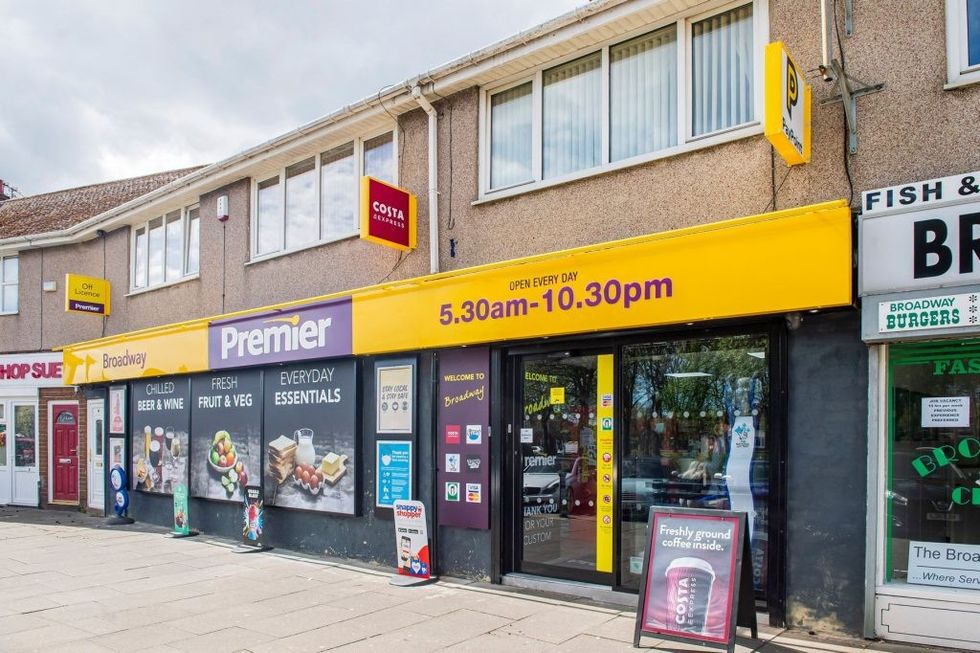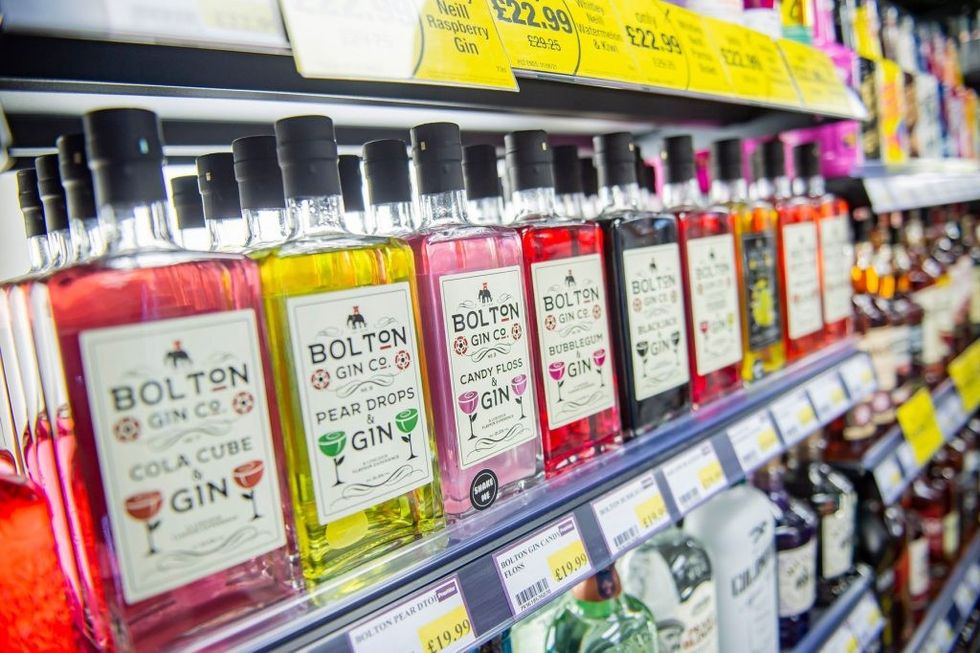The Asian Trader Independent Retailer Award, supported by Booker Wholesale, recognises an entrepreneur who has built a successful convenience business and an outstanding store which has seen spectacular results in both turnover and customer numbers. And in Pete Saleem, winner of the 2021 edition, we meet a retailer who fits the bill to a tee, with his immaculate shop: Premier Broadway Circle in Blyth, Northumberland.
Pete merged two spaces into a modern convenience store in January last year, and sales immediately shot up by 40 per cent. As the development work took place during lockdown, he continued to serve customers from a container parked outside.
The shop was extended by 500 sq ft to 1,500 sq ft, with the increased space entirely dedicated to alcohol, including the creation of a beer cave. They stock 126 different varieties of gin, possibly the biggest range of any independent shop in Northumberland.
“As a family, we have been trading on the same parade of shops since 1988 but it was clear to me that to take our business to the next level what we needed was a modern convenience store,” Pete says.

They had two nearby shops, one with an alcohol license and the other, without. The joke in the town went that they were becoming an “inconvenience store”, says Pete, laughing, “Because you buy a loaf of bread from one shop, but for a bottle of wine you walk to the other. It wasn't good. So we needed to integrate the two businesses,” he says.
It was to be a serious investment, and in fact they started the planning about five years ago, in 2017. “There was a lot of work that went in behind the scenes before we even put anything out in the shop. That was probably the easiest part. The hardest was the preparation,” he explains.
“It's not a huge shop, but in order to do this, the sales that we were predicting, we needed to create a bit more space. And that's what we did, by creating the beer cave.”
What happens in Vegas …
The beer cave is an idea he brought home from the US city where the Saleem brothers – six of them – went for a birthday party. “On visiting Las Vegas, it became very apparent that everything is beer cave,” he says.
“We got off the plane, and were transported to one of these places to have a look. And I said to the boys, ‘I'm gonna have one of these in the shop,’ and they just thought I was cracking a joke. But as soon as I saw that concept in Las Vegas, straightaway I knew I needed to have have that, because it gave us a unique selling point. I was getting to the stage where I was sick of hearing, ‘get this for this price and go to Morrison's for that price. But they can't get those prices chilled. They don't do it. It gives us a USP and if nothing else, it makes your shop a destination.”
As part of the refit, they also created a new food-to-go section from scratch, including Costa Coffee, f’real milkshakes, fwip ice cream, Jolly Rancher, Hershey's Freeze and Tango Ice Blast.
“It’s a new way of bringing shoppers into the store. We’ve gone from half a metre of chilled food to seven metres. Now we are selling fresh pizzas, ready meals and all the ingredients for a family supper. Basket spend has improved because shoppers are enjoying the benefit of doing all their shopping under one roof,” he says.
Booker brought to his attention the fact that food-to-go was a huge growth sector, and that he needed to be involved, Pete admits, adding that the advice has really paid off.
“I never visited a Costa, but the Costa has been a fantastic asset to the business; f’real has been a huge hit; Tango Ice Blast creates such a focal point, a destination for people to come to,” he says. “That's where the market is going. And we need to go in that direction.”
All about planning
Discussing his experience of the refit, Pete stresses the importance of planning. “If you go into something blind, you could end up digging a big hole for yourself,” he notes, “It's all about the planning: planning, preparation, making sure your funding is in place.”
He says a retailer needs to have a vision of what they want to do, the know-how and the correct work colleagues when it comes to builders, shop-fitters, fridge engineers, electricians, plumbers and CCTV. Pete worked with his own contacts as they have contractors who work for them on a daily basis.
“My planning was so detailed, every contractor was at [a] meeting and I said, ‘Look, we've got 29 days to do this. We are closing on the first of January and will open on the 30th.’ And everyone looked at each other and said ‘Are you for real, there's so much to do.’”
Their concern was justified as they had to go back to bare walls and floors, putting in new flooring and ceilings and everything in between.
“And I said we'll have to work on the clock, work collectively as a team: we have to get this done and we have no choice in the matter. And you know what, it was because if that organisation, that communication that we achieved what we did in 29 days,” he says.
Keeping it local
The Covid-19 pandemic pushed local products into the limelight, alongside the “shop local” trend. The range of local products, including bread, pies, sandwiches, pasties, cream cakes, eggs, fresh meat and frozen curries, has been another USP of Pete’s store, and as these products are displayed better in the new shop, sales of local lines have doubled, he says.
“We've always supported our local produce, our local suppliers, it's always been important for us. When we did the refit, we made sure that all this local produce had its place in-store. They got more of a facing in the new store than they had in the past,” he says.
He also credits Booker for making space for local products during the refit.
“Our relationships with other local businesses have held us in good stead over the years, and Booker recognise the value of this. During the refit, Booker asked us which local suppliers we worked with. They were all allocated a space in the plan, and it was great to know that our wholesale supplier was able to see the bigger picture and work with us to make the shop as attractive as possible,” he says.
Connecting on the doorstep
Even before the pandemic, the Saleems used to offer a home delivery service, though it was rather community-related back then.
“My father and my mother, God bless them, they always had a list of customers who they would deliver to because they were housebound, or they couldn't get out or they weren't as mobile,” he explains.
“They had about 16 people on that list. Then the pandemic came. And to be honest with you, that list grew to about 34 during the pandemic, but we have quickly seen that there was a requirement for home delivered, not just for the elderly, because people were wanting to stay safe.”
They went live with Snappy Shopper when they re-opened the store, in February last year, and Pete says its growing week on week, even after 15 months.
“It's a huge growth sector. We now have six drivers. We've actually bought an electric vehicle. We quickly recognised that there's a lot of talk of climate change at the moment. And it's not going to get any better unless we do something about it. That's why we invested in this electric vehicle. We use that for deliveries and the customers really appreciate it,” he says.
They also stick to the delivery time of 30 minutes, which offers them a point of difference compared with the supermarkets’ offering.
It has been a heavy investment, he agrees, and initially drivers weren’t always busy. “But, everything has to start somewhere,” he notes. “Now it's a business that in itself is very sustainable. And it's a big part of our business now.”
From the list of 16 his parents used to look after, they now have over 600 customers they deliver to at least once a week. That’s the scale of where it's going, and Pete attributes this to the changes in shopper habits driven by the pandemic.
“I think that a lot of people shifted to home delivery probably because of a confidence thing, because Covid was dangerous. Now it's almost away hopefully but people's buying habits haven't changed. They haven't reverted to the multiples,” he says.
Part of the reason would be the face-to-face engagement that they now extend to their customers’ doorsteps.
“I would personally, like my father, go and do the deliveries, if the drivers are getting busy,” he says. “We have to ensure that we maintain the level of service. This is really key, by the way,” he nods.
“Having that face to face and having that product delivered to them, as they need it within 30 minutes, was really well accepted by our customers, and they really appreciate it. A lot of people that work for me will drop at the doorstep, stand back and say hello. We will connect on the doorstep.”
He says the service needs hard work, but he finds it personally rewarding. “Those people are still buying from us now. They can easily go anywhere else. But they do remember the fact that we were there for them, when they needed us,” he says.
Ace-ing social media
The store is strong on social media, particularly Facebook: “In the demographic area that we are situated, it's all about Facebook,” Pete says – where they push their offers and services like home delivery to their followers.
“I think it's one of those things that you've got to work on. You can't just do it once and then just ‘oh, I’ll do it maybe again in few days’ time’. You've got to be continuous,” he says. “And in order to get your message out there, you have to push your brand; you have to put yourself at the forefront of people's minds.”
He says they get to know the power of Facebook to drive sales whenever they have new products to offer. Recently they announced the launch on Gordon's Cherry Gin on their page, and the bottles flew off the shelves within an hour.
“That was all down to Facebook, if we didn't have that tool, potentially we wouldn't get that custom,” he says, noting that Facebook gives them a mechanism to amplify what they have always worked on in the past: word of mouth.
“Those things are really cool. If the customer can come in and get whatever they want from your store, that gives you a good reputation. It's good. If the word of mouth is not positive, the customers won't come to your shop. So those things are really important,” he sign off.







